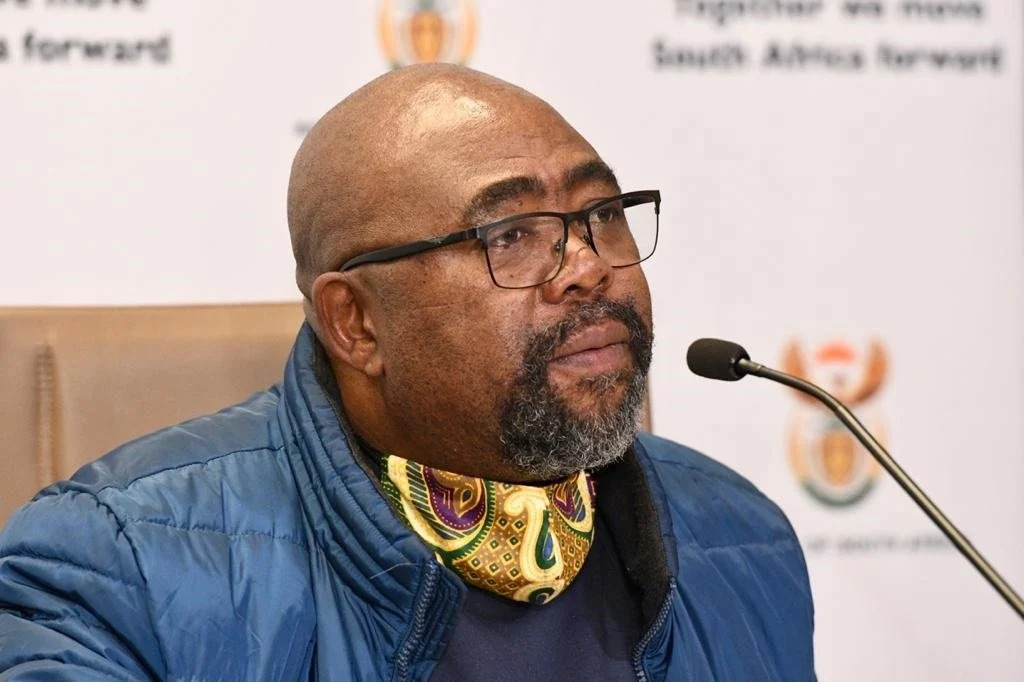SA bans Zimbabweans from starting small businesses in some sectors

SA Labour Minister Thulas Nxesi
- Employment and Labour Minister Thulas Nxesi released the National Labour Migration Policy for public comment on Monday afternoon.
- This will introduce new employment quotas on foreign workers, as well as ban foreigners from starting small businesses in some sectors.
- “Migrants are in particular concentrated in informal sector – a worrying trend,” government said in a statement.
Government will introduce new employment quotas on foreign workers, as well as ban foreigners from starting small businesses in some sectors.
On Monday, Employment and Labour Minister Thulas Nxesi introduced the National Labour Migration Policy (NLMP) and Employment Services Amendment Bill for public comment.

The NLMP will introduce quotas on the total number of documented foreign nationals with work visas that can be employed in agriculture, hospitality and tourism, as well as construction, along with other sectors.
The limit on foreign nationals will be set by the minister of labour, and the quotas will differ per occupation, sector or region. Quotas would apply not only to formal employees, but also to anyone paid for any work as well as “platform workers”, such as Uber drivers.
The proposed new legislations will be accompanied by amendments to the Small Business Act, which will limit foreign nationals from establishing small and medium-sized enterprises and trading in some sectors of the economy. This will include a list of sectors where foreign nationals cannot be allocated business visas.
Foreign nationals will include all people who aren’t citizens, permanent residents or refugees
There are four million foreign born persons in SA, representing 4% of the population and 7% of the labour force, government said.
“Especially since 2000, the influx largely of undocumented migrant workers has increased dramatically in an ever-expanding range of sectors. Migrants are in particular concentrated in informal sector – a worrying trend,” the department of labour said in a presentation.
Nxesi said it was critical for government to act and curb the hiring of foreign nationals in the country, as employers were exploiting desperate foreign nationals and “distorting the labour market”.
Nxesi released the National Labour Migration Policy for public comment on Monday afternoon, following an extensive period of consultation with his colleagues in Cabinet.
The policy will now be available for public comment for 90 days, after which it will be referred back to Cabinet with inputs and to Parliament.
The Department of Employment and Labour, Cabinet approved the release of the National Labour Migration Policy for public comment last Wednesday after extensive consultation between government structures, Nxesi and Home Affairs Minister Aaron Motsoaledi.
Nxesi said employers must satisfy themselves that there is no availability of the requisite skills before opting to hire a documented foreign national. He stressed that government would not undermine the rights of foreign nationals in implementing the policy.
“In terms of the law, we can’t ban the employment of the foreign nationals. It will not allow us. The Constitution of this country will not allow us to do that. We can limit and control it. That is what we are trying to do,” said Nxesi.
Nxesi said along with the migration labour policy, the strengthening of border management policy will be prioritised. He said that his department is stepping up inspections to enforce existing labour and immigration legislation.
Deputy director-general of public employment services Sam Marotoba said it was able to identify “red spots” in migration pressures, including those with special dispensation permits and those who have overstayed in the country.
Marotoba said after conducting research and consultations at government level, the department had to hold cluster and socioeconomic impact consultations with legal advisors.
“This is what took us so long and we are going to embark on public consultation processes. In June we will go to Nedlac and depending on the amount of inputs and comments, we will report to Cabinet and Parliament by July,” said Marotoba.
He said South Africa would consult with the African Union, the Southern African Development Community and other regional groupings as the policy is implemented. Nxesi said the consultation process on the policy would be concluded within 90 days.
Pressing labour matters
Nxesi said, after a standoff with truck drivers over the inclusion of their profession in the policy, government had been engaging with truck drivers as recently as last week and was told that truck drivers were looking forward to making inputs on the policy document.
In a veiled reference to the conduct of the EFF who have conducted inspections at restaurants looking for expatriate employees, Nxesi warned that illegal inspections of workplaces looking for documented migrants would not be tolerated and that is was “destructive” and “irresponsible” of political parties to do so.
The National Labour Migration Policy and Employment Services Amendment Bill also makes provision for the “reintegration of the South African diaspora into the domestic economy”. This includes the developing of “incentives” for South African workers abroad to “impart skills and invest in labour market and other initiatives in South Africa”.
–Media24







